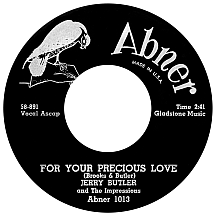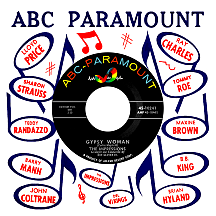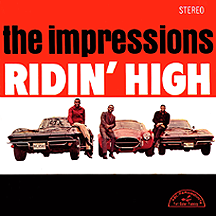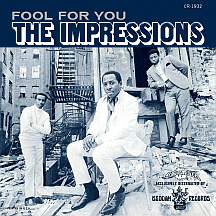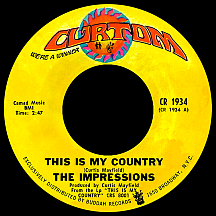THE IMPRESSIONS
Sam Gooden has had an exceptional career in show business as the longest-running member of The Impressions, the milestone vocal group that formed in 1957. Two of his cohorts during the late '50s are nearly as significant: Jerry Butler, after spending a short time with the outfit as lead singer, went on to major stardom as a cool-as-ice solo act, while his replacement, Fred Cash, joined with Gooden to keep the group going...for six decades! But if you talk to any of these three, or anyone else involved with the act, they'll be unanimous on one point: there was one man who made the difference, one man whose creativity, musicianship and drive assured the success and, perhaps more importantly, significance of the group. Curtis Mayfield had a depth of character that seemed to make him unafraid to go where few popular artists ventured, as he frequently infused his music with a gospel flavor and commentary on politics and the racially volatile climate of the era.
Curtis met Jerry Butler during their adolscent years, singing in church in Chicago; both were members of The Northern Jubilee Gospel Singers (with Mayfield's cousins Sam, Tommy and Charles Hawkins) prior to embarking on secular careers. Butler, whose family had moved to the Windy City from Sunflower, Mississippi in 1943 when he was three, sang briefly in the mid-'50s with a doo wop group, The Quails. Mayfield, a native Chicagoan, earned his street corner stripes at about the same time with The Alphatones. Sam Gooden had already been at it for awhile; earlier in the decade, the 16-year-old was in a gospel choir, The Southland Jubilee Singers, in his home town, Chattanooga, Tennessee. Fred Cash, who was several years younger, joined a few years later. They started a secular group, Four Roosters and a Chick, with Arthur Brooks, Emanuel Thomas and his sister Catherine; after she left, Arthur's brother Richard stepped in and the quintet became The Roosters.
Thomas and the younger Cash dropped out when the other members of the Roosters moved to Chicago. Butler and Mayfield replaced them and this lineup became permanent, at least long enough for them to get a recording contract...and change their name. Approaching several companies, they met with rejection until Eddie Thomas, a promotional rep for Vee-Jay, the former Gary, Indiana company that had relocated to Chicago, saw the quintet perform and set up an audition with VJ co-owner Calvin Carter. Changing their rural moniker to something more sophisticated, a single was released under the name Jerry Butler and the Impressions on subsidiary label Falcon; shortly afterwards, the label's name was switched to Abner (after Ewart Abner, part owner of the company), though the label itself kept the logo of a gloved hand with a falcon on it (apparently by mistake, a few copies of the single also slipped out on the Vee-Jay label). "For Your Precious Love," an endless-love kind of ballad composed by Jerry, Arthur and Richard, was one of the biggest hits of the summer of 1958, making the rhythm and blues top ten and just missing the same level on the pop charts; it's considered by many doo wop fans as one of the genre's great classics (its flip side, the uptempo "Sweet Was the Wine," wasn't shabby either and could easily have been a hit as well).
Vee-Jay's designation of Butler as the credited leader created a problem for the group's other members; the follow-up single, "Come Back My Love" (penned by Roy Hamilton and Clyde Otis), was issued as The Impressions featuring Jerry Butler and made a brief appearance on the R&B chart in October. The third single, "Gift of Love," another ballad with Jerry again singing lead, was credited to, simply, the Impressions. Company founders Calvin and his sister, Vivian Carter, made no apologies about favoring Butler, convincing him to sign a solo contract. The focus shifted to Jerry's career and he notched two R&B chart singles, albeit minor ones, on Abner during the next 18 months. Curtis Mayfield took over as the group's lead singer (often playing guitar as well), and former Rooster Fred Cash took Jerry's place, but after two more singles (one from an earlier session with Butler), the quintet was dropped from the label.
One-shot releases on the small Bandera and Swirl labels failed to improve the group's standing, nor did "All Through the Night" on 20th Century-Fox. After some time apart, Jerry and Curtis composed "He Will Break Your Heart," Butler's first release on the parent Vee-Jay label. Featuring harmony vocals and guitar work by Mayfield, it became a top ten pop and number one R&B smash in late '60, putting Jerry's career on the fast track. Sticking with this formula, he had two more hits in '61 ("Find Another Girl" and "I'm a Telling You") and Curtis continued contributing to Jerry's recordings for the next few years. Mayfield kept a busy schedule during this time; ABC-Paramount, one of the industry's more aggressive major labels (the lucrative offer extended to Ray Charles in late '59, which he accepted, had led to massive sales, airplay and industry awards), made another risky move in '61, signing the Impressions to a long-term contract. It ultimately paid dividends to everyone involved.
Mayfield displayed a knack for storytelling with the exotic "Gypsy Woman," featuring his soon-to-be-familiar falsetto lead vocal against a castanet backing seldom heard in popular hits. It reached the top 20 on the pop charts in December and hit number two on the R&B charts (behind The Marvelettes' Motown monster "Please Mr. Postman"). Big follow-up hits didn't appear right away, but Mayfield songs in '62 like "Grow Closer Together," "Little Young Lover" and "Minstrel and Queen" were outstanding Impressions efforts deserving of more attention. With a contract that allowed him the freedom to write and produce outside artists, Curtis composed and produced "Mama Didn't Lie" for Jan Bradley, a big hit on Chess in early '63. A clash with the Chess brothers over royalty payments riled him enough to produce a cover version for ABC-Paramount by The Fascinations, a girl group he had discovered, though Jan's original came out on top. Despite this bad experience, he went looking for more opportunities to moonlight between Impressions sessions.
Two 1963 singles by the group, "I'm the One Who Loves You" and "Sad, Sad Girl and Boy," showed more promise than any of the '62 releases but managed no more than mid-chart results. Curtis began working with Major Lance, an old friend of his and Jerry's from their northwest Chicago neighborhood. Several of his songs were hits for Lance on Chicago's Okeh label (some of them with vocal backing by the Impressions), beginning with the summer '63 dance delight "The Monkey Time." Meanwhile, changes were taking place within the ranks of the Impressions; Richard and Arthur Brooks called it quits and Mayfield, Gooden and Cash decided to move forward as a trio.
Just as Major Lance was thriving, thanks to Mayfield's songs and the unique trombone-based arrangements devised by Okeh Records head Carl Davis and arranger Johnny Pate, the Impressions delivered on ABC-Paramount's investment with "It's All Right," boasting a celebratory gospel sound against a strong horn section arranged by Pate, who ended up working with Mayfield for many years. A new Chicago soul sound was taking shape, personified by this breakthrough (top five pop and number one R&B in the fall of '63) and Lance's early-'64 smash, Mayfield's cleverly confounding composition "Um, Um, Um, Um, Um, Um." He composed songs and produced recordings for a number of other singers including Gene Chandler and Okeh artists Walter Jackson and Billy Butler and the Chanters (led by Jerry Butler's younger brother), but with hits suddenly coming one after another, the Impressions were top priority.
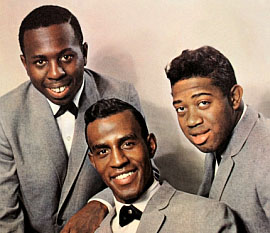
Romantic songs like "Talking About My Baby" and "I'm So Proud" soared up the charts in the early months of 1964. The Impressions' music frequently utitlized a gospel feel while serving as Mayfield's political outlet, a bold direction few artists dared to touch on. "Keep on Pushing" addressed the struggle of minorities ('...I've got my pride...and I'll push the wall aside') and, perhaps surprisingly, it met with little resistance, landing the group back in the pop top ten and all the way to the number one R&B spot that summer, resulting in a Grammy nomination (oddly, their only one) early the following year. The group's hot streak continued in the fall with "You Must Believe Me" followed by "Amen," a traditional gospel song. Its prominent use in the 1963 film Lilies of the Field, starring Sidney Poitier in his Oscar-winning role (his singing voice was dubbed by Jester Hairston, who had adapted and popularized the song), was so moving to Curtis that he felt he must do his own version. Illustrating what can happen when you follow your gut instincts, the Impressions' spirited rendition was a giant hit, topping the R&B charts in December and placing them in the pop top ten for the third time in a little over a year.
Overflowing with inspirational ideas, Mayfield penned his own gospel song, "People Get Ready" ('...don't need no ticket, you just thank the Lord'), an early 1965 hit that is considered by some the quintessential Impressions recording. Gospel rhythms permeated the group's music for a time, sometimes in the arrangement of songs like "Woman's Got Soul," other times through suggestion of religious faith, as in the lyrics of "Meeting Over Yonder." For whatever reason, the group gradually faded from the mainstream in 1965 as British Invasion acts and American folk rock bands signaled a musical shift, though they remained strong among the black community.
Around the time "You've Been Cheatin'" was a top 40 hit in early 1966, Mayfield started his own label, Windy C, though there were only eight singles released through the following year, seven by Chicago-based youth act The Five Stairsteps (a few were minor hits) and one by June Conquest. The company folded in '67. Curtis branched out with the eponymous Mayfield label, notable for a handful of releases by The Fascinations, the girl group he had discovered a few years earlier. The Mayfield Singers, a new vocal trio he assembled, also had one single in 1966, but without any big hits to bring in much-needed cash flow, this second venture went the way of Windy C.
Bursting with creative ideas, Curtis composed dozens of songs that ended up on Impressions singles and albums during 1966 and '67, yet nothing clicked on a level with the group's '63 through '65 output. Jerry Butler experienced a similar drought after leaving Vee-Jay, but a successful new career phase began after he signed with Mercury Records and began working with producers Kenny Gamble and Leon Huff; nicknamed "The Iceman" for his cool vocal style, Butler had a strong series of hits ("Never Give You Up," "Only the Strong Survive" and several others) between 1967 and '69. Curtis, Sam and Fred had a resurgence as well, starting with the early 1968 hit "We're a Winner," thematically reaffirming the civil rights essence of "Keep on Pushing," which returned them to familiar chart territory (number one R&B, top 20 pop) for the first time in over three years.
Later that year, Mayfield and Eddie Thomas (who'd been the group's manager since '58) started yet another label, Curtom (after the name of their music publishing company) with distribution handled by the recently-formed Buddah Records (The Isley Brothers made a similar arrangement for distribution of their T-Neck imprint the following year). The Five Stairsteps (and, later, Major Lance and Gene Chandler) recorded for Curtom, its label proudly stating "We're a Winner," but the Impressions, having switched to the new label, predictably achieved the most success. "Fool For You" was the label's first hit in the fall of '68; "This is My Country" ('...shall we perish unjust or live equal as a nation?') and "Choice of Colors" ('...a better day is coming for you and me') tackled controversial topics head-on and were the top Impressions hits of '69.
"Check Out Your Mind," a funky, trippy hit in the summer of 1970, was Curtis's last with the group. He continued writing songs for the trio while building a body of solo recordings; Leroy Hutchins (a former member of the Mayfield Singers) stepped in and the Impressions didn't miss a beat, regularly hitting the charts with songs like "(Baby) Turn On to Me" in '70 and "Ain't Got Time" in '71. Curtis composed the score for the 1972 film Superfly starring Ron O'Neal and it wound up being his greatest success. Much in the way Isaac Hayes had done the previous year with his Shaft movie score, Mayfield received rave reviews and sold more than a million copies of the soundtrack album, which topped the charts in October. Two major hits emerged: the downbeat "Freddie's Dead" in late '72 and title theme "Superfly" in early '73.
By 1974 the remaining Impressions were working with Ed Townsend (the singer best known for his 1958 hit "For Your Love"), who composed and produced their last major pop (and number one R&B) hit, "Finally Got Myself Together (I'm a Changed Man)." A fresh hit streak ensued ("Sooner or Later," "Same Thing it Took") and lasted until 1976, while the Curtom label remained in operation through the end of the decade. The Impressions continued recording for Cotillion, Chi-Town and MCA with later members including Nate Evans and Reggie Torian.
Mayfield's life took a tragic turn on August 13, 1990, when a lighting unit, loosened by heavy winds, fell on him just before a scheduled outdoor concert in Brooklyn, New York; his entire body below the neck was paralyzed for the remainder of his life. An outpouring of tributes came from his peers in the music industry. His situation worsened through the decade, though he recorded one final album, New World Order, in 1996. Two years later his right leg was amputated due to complications from diabetes; he died in December 1999 at age 57. As I write this, The Impressions, with Sam Gooden and Fred Cash carrying the name well into its sixth decade, are still performing regularly; in interviews, they fondly reminisce about their friend Curtis Mayfield, the creative force behind one of the all-time greatest music acts.
NOTABLE SINGLES:
- For Your Precious Love - 1958
by Jerry Butler and the Impressions / - Sweet Was the Wine - 1958
by Jerry Butler and the Impressions - Come Back My Love - 1958
by The Impressions featuring Jerry Butler - Gift of Love - 1959
- All Through the Night - 1960
- Gypsy Woman - 1961
- Grow Closer Together - 1962
- Little Young Lover - 1962
- Minstrel and Queen - 1962
- I'm the One Who Loves You - 1963
- Sad, Sad Girl and Boy - 1963
- It's All Right - 1963
- Talking About My Baby - 1964
- I'm So Proud - 1964
- Keep on Pushing - 1964
- You Must Believe Me - 1964
- Amen - 1964 /
Long, Long Winter - 1965 - People Get Ready /
I've Been Trying - 1965 - Woman's Got Soul - 1965
- Meeting Over Yonder - 1965
- I Need You - 1965
- Just One Kiss From You - 1965
- You've Been Cheatin' - 1966
- Since I Lost the One I Love - 1966
- Too Slow - 1966
- Can't Satisfy - 1966
- You Always Hurt Me - 1967
- I Can't Stay Away From You - 1967
- We're a Winner - 1968
- We're Rolling On - 1968
- I Loved and I Lose - 1968
- Fool For You - 1968
- Don't Cry My Love - 1968
- This is My Country - 1969
- Seven Years - 1969
- Choice of Colors - 1969
- Say You Love Me - 1969
- Check Out Your Mind - 1970
- (Baby) Turn On to Me - 1970
- Ain't Got Time - 1971
- Finally Got Myself Together (I'm a Changed Man) - 1974
- Sooner or Later - 1975
- Same Thing it Took - 1975
- Loving Power - 1976


